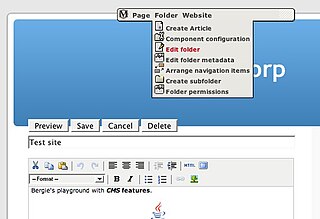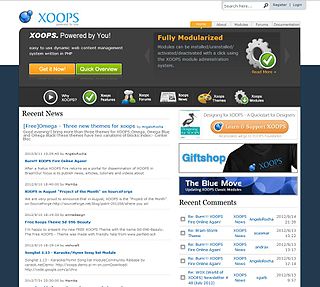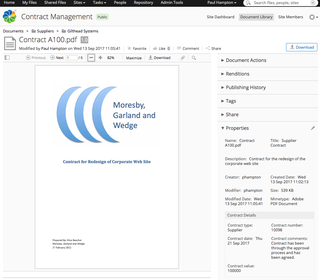
Wiki software is a collaborative software that runs a wiki, which allows users to create and collaboratively edit "pages" or entries via a web browser. A wiki system is usually a web application that runs on one or more web servers. The content, including all current and previous revisions, is usually stored in either a file system or a database. Wikis are a type of web content management system, and the most commonly supported off-the-shelf software that web hosting facilities offer. There are currently dozens of actively maintained wiki engines, in a variety of programming languages, including both open source and proprietary applications. These vary widely in their platform support, in their support for natural language characters and conventions, and in their assumptions about technical versus social control of editing.

A website is a collection of related web resources, such as web pages, multimedia content, which are typically identified with a common domain name, and published on at least one web server. Notable examples are wikipedia.org, google.com, and amazon.com.
A content management system (CMS) manages the creation and modification of digital content. It typically supports multiple users in a collaborative environment.
Jakarta Slide is an open-source content management system from the Jakarta project. It is written in Java and implements the WebDAV protocol. Slide is a set of APIs to implement the WebDAV client. Thanks to that, Slide can also be seen as a Content Management Framework. The use of WebDAV, which is a superset of HTTP, makes Slide an ideal candidate for web-based content management. Among the applications of Slide are its use as a file server, in intranet applications, and as an excellent repository for XML both as properties and versioned files for persistence of JavaBeans. It also has an extensible storage mechanism that can be used for Integration and adaptation.

Midgard is an open source persistent storage framework. It provides an object-oriented and replicated environment for building data-intensive applications.

Tiki Wiki CMS Groupware or simply Tiki, originally known as TikiWiki, is a free and open source Wiki-based content management system and online office suite written primarily in PHP and distributed under the GNU Lesser General Public License (LGPL) license. In addition to enabling websites and portals on the internet and on intranets and extranets, Tiki contains a number of collaboration features allowing it to operate as a Geospatial Content Management System (GeoCMS) and Groupware web application.

Application software is computer software designed to perform a group of coordinated functions, tasks, or activities for the benefit of the user. Examples of an application include a word processor, a spreadsheet, an accounting application, a web browser, a media player, an aeronautical flight simulator, a console game or a photo editor. The collective noun application software refers to all applications collectively. This contrasts with system software, which is mainly involved with running the computer.

WebGUI is an open-source content management system written in Perl and released under the GNU General Public License.

XOOPS is a free open-source content management systems (CMS), written in PHP. It uses a modular architecture allowing users to customize, update and theme their websites. XOOPS is released under the terms of the GNU General Public License (GPL) and is free to use, modify and redistribute.
eZ Publish was an open-source enterprise PHP content management system developed by the Norwegian company eZ Systems. eZ Publish is freely available under the GNU GPL version 2 license, as well as under proprietary licenses that include commercial support. In 2015, eZ introduced Platform, which was meant to replace Publish.
A web content management system is a software content management system (CMS) specifically for web content. It provides website authoring, collaboration, and administration tools that help users with little knowledge of web programming languages or markup languages create and manage website content. A WCMS provides the foundation for collaboration, providing users the ability to manage documents and output for multiple author editing and participation. Most systems use a content repository or a database to store page content, metadata, and other information assets the system needs.

LAMP is an archetypal model of web service stacks, named as an acronym of the names of its original four open-source components: the Linux operating system, the Apache HTTP Server, the MySQL relational database management system (RDBMS), and the PHP programming language. The LAMP components are largely interchangeable and not limited to the original selection. As a solution stack, LAMP is suitable for building dynamic web sites and web applications.

Alfresco is a collection of information management software products for Microsoft Windows and Unix-like operating systems developed using Java technology. Their primary software offering, branded as a Digital Business Platform is proprietary & a commercially licensed open source platform, supports open standards, and provides enterprise scale.
Enterprise social software, comprises social software as used in "enterprise" (business/commercial) contexts. It includes social and networked modifications to corporate intranets and other classic software platforms used by large companies to organize their communication. In contrast to traditional enterprise software, which imposes structure prior to use, enterprise social software tends to encourage use prior to providing structure.
Software categories are groups of software. They allow software to be understood in terms of those categories instead of the particularities of each package. Different classification schemes consider different aspects of software.
PHP-Fusion is a constantly evolving free and open-source web framework based on PHP and MySQL that has an integrated content management system (CMS) among many other features. Its primary attribute of note is that is an extremely collaborative system.










